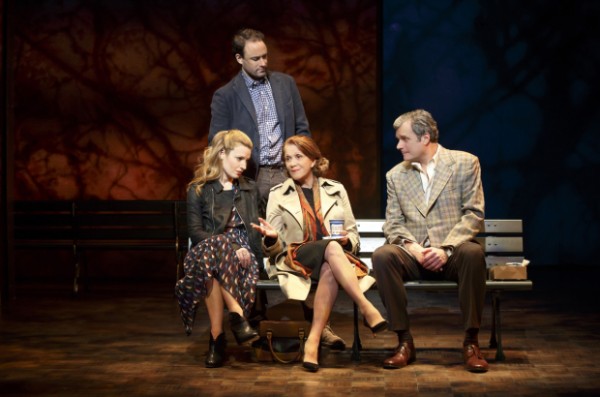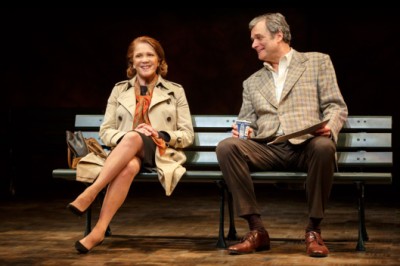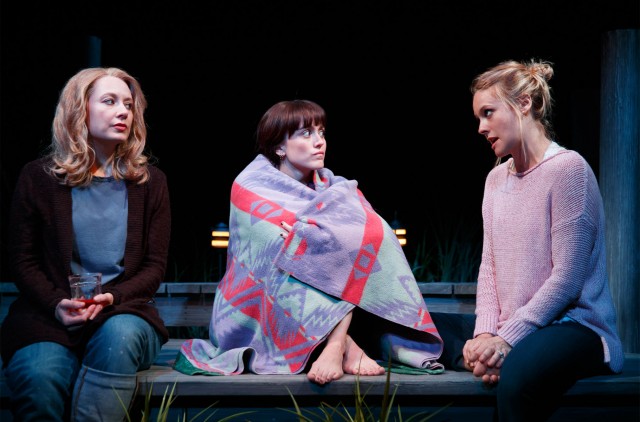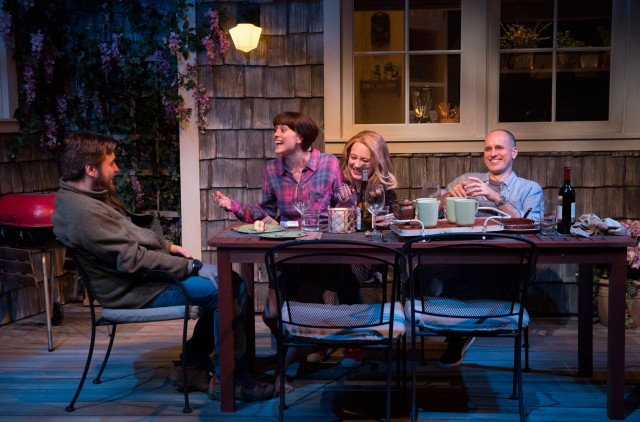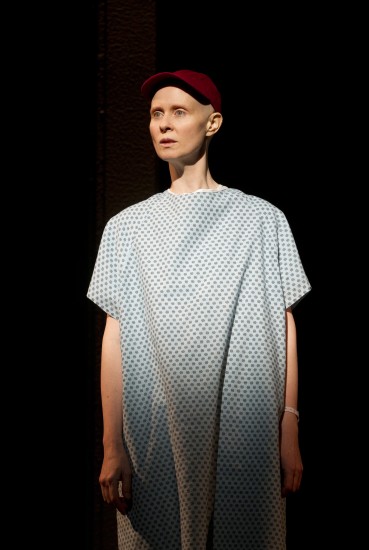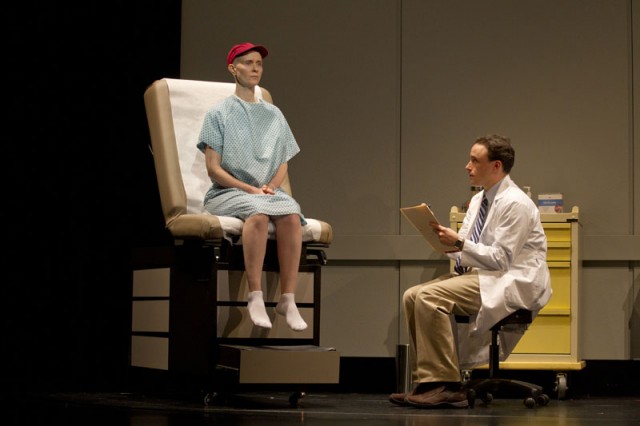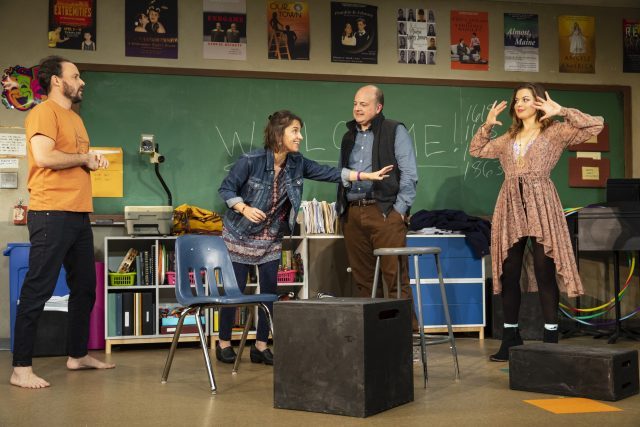
Greg Keller, Jennifer Bareilles, Jeffrey Bean, and Margo Seibert star in The Thanksgiving Play at Playwrights Horizon (photo by Joan Marcus)
Playwrights Horizons
Peter Jay Sharp Theater
416 West 42nd St. between Ninth & Tenth Aves.
Tuesday – Sunday through December 2, $49-$89
www.playwrightshorizons.org
I am not a fan of Thanksgiving. But I am a fan of Larissa FastHorse’s extremely funny and spot-on The Thanksgiving Play, which opened last night at Playwrights Horizons. Not to sound holier than thou, but I’ve long given up stuffing my face with turkey and watching football while celebrating genocide on the fourth Thursday of November; my pescatarian wife and I try very hard to leave the country every Thanksgiving weekend just to avoid it all — and to not have to choose whose family we will be going to each year. But you don’t have to love or hate the holiday to get a huge kick out of the show. After years of being told that her plays were uncastable because theaters had no access to Native American actors, Sicangu Lakota playwright FastHorse came up with the rather simply titled The Thanksgiving Play, a wild and woolly farce that takes on important indigenous issues — in real life and on the stage — while featuring four characters played by white-presenting performers. The festivities begin with a preamble, as three members of the cast (Jennifer Bareilles, Margo Seibert, and Greg Keller), dressed in pilgrim costumes, and the fourth (Jeffrey Bean), in a giant, silly turkey outfit, stand in front of the curtain and sing “On the First Day of Thanksgiving” (sample verse: “On the third day of Thanksgiving the natives gave to me / three Native headdresses, two turkey gobblers, and a pumpkin in a pumpkin patch”). At the end of the song, the turkey explains, “Teacher’s note: This song can do more than teach counting. I divide my students into Indians and pilgrims so the Indians can practice sharing.”

Logan (Jennifer Bareilles) and Jaxton (Greg Keller) have a slight disagreement as they collaborate on school play about first Turkey Day (photo by Joan Marcus)
Ridiculously PC drama teacher Logan (Bareilles) is starting rehearsals for the annual school Thanksgiving play, which will star her boyfriend, Jaxton (Keller), a yoga practitioner and street performer; Caden (Bean), an elementary school history teacher and amateur actor and writer; and Alicia (Seibert), an ambitious, if not very bright, LA actress whose resume contains numerous Disney roles at theme parks and the like. Logan wants to make a devised piece about the first Thanksgiving, with all four of them participating in the show’s development. While Caden seeks to delve deep, deep, deep into the history of Thanksgiving and Alicia is looking forward to a lovely story with all the trimmings, Logan and Jaxton are absurdly careful about each word, each prop (the costumes and puppets are by Tilly Grimes), each plot point. “We start with this pile of jagged facts and misguided governmental policies and historical stereotypes about race, then turn all that into something beautiful and dramatic and educational for the kids,” Jaxton explains. Meanwhile, Logan, who is worried that she will lose her job if the play goes wrong, calls Thanksgiving “the holiday of death.” Logan and Jaxton keep painting themselves into a corner as they reject characters, dialogue, costumes, and situations that they believe are racist, ethnocentric, stereotypical, and/or insulting to indigenous peoples, especially since their play is being written and performed without any input at all from Native Americans. And the further into the corner they recede, the more unlikely it is they will ever be able to accomplish anything.
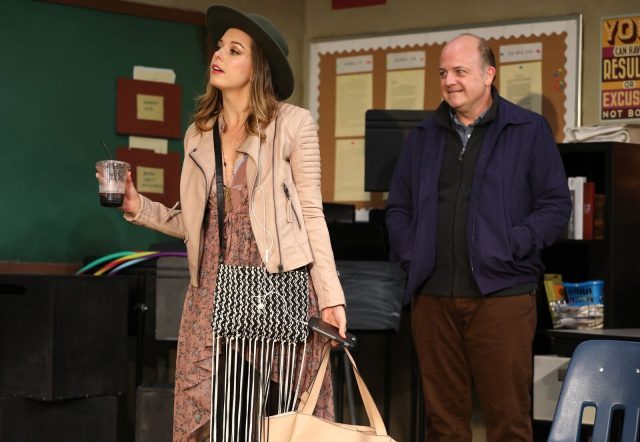
Caden (Jeffrey Bean) has trouble keeping his eyes off Alicia (Margo Seibert) in sociopolitical farce by Larissa FastHorse (photo by Joan Marcus)
Director Moritz von Stuelpnagel (Hand to God, Present Laughter) lets Bareilles, Bean, Seibert, and Keller run rampant on Wilson Chin’s schoolroom set, which includes posters of student productions of some rather adult shows. The farce gets out of hand at times, working better when it stays more grounded, since it is easy to believe that there are people like this who are so politically correct that they trap themselves in inaction and an innate inability to say anything, unaware of how to actually be an ally. One of the main reasons why The Thanksgiving Play, which runs until the day after the holiday [ed. note: it has now been extended through December 2], works so well, despite the occasional bumpiness, is because we recognize parts of ourselves in the four characters; of course, off-Broadway audiences tend to be significantly liberal — and often privileged — terrified of uttering or doing the wrong thing when it comes to people of color yet rather clueless about their own giant blind spots. Thus, there are moments in the show when you are likely to hesitate before laughing, wondering whether you are being insensitive by enjoying yourself too much.
FastHorse, a former television writer and ballet dancer, has dedicated her playwrighting career to establishing an authentic indigenous voice in American theater, as seen in such previous shows as Cherokee Family Reunion, Urban Rez, and What Would Crazy Horse Do? But she has met significant resistance; even her casting note for The Thanksgiving Play is controversial: “[People of color] who can pass as white should be considered for all characters.” She is attempting to level the playing field by increasing diversity and pushing an own-voices sensibility. The Thanksgiving Play, in which all participants, cast and crew, are new to Playwrights Horizons, is a big step in that direction. Be sure to get to the theater early so you can check out the exhibition on the third floor, a collection of works curated by Emily Johnson, who is of Yup’ik descent, from Johnson and Maggie Thompson’s “Then a Cunning Voice and a Night We Spend Gazing at Stars” quilts and Shan Goshorn’s “The Value of Integrity” container to Maria Hupfield’s “Solidarity Acknowledgment Banner” and “Plays to Be: all the plays by Indigenous playwrights not yet produced and/or not yet written,” such as A Rez’n in the Sun, Lasting of the Mohegans, Six Degrees of Blood Quantum, and Who’s Afraid of Virginia Colony? Even the bathrooms are involved, displaying such quotes as this one from Winona LaDuke in 2017: “It is possible to have an entire worldview that does not relate to empire.” Happy Turkey Day, everyone!


